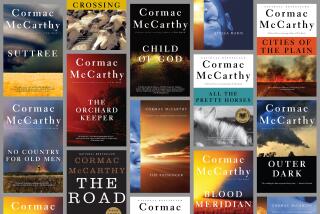First Fiction
- Share via
The Coast of Akron
A Novel
Adrienne Miller
Farrar, Straus & Giroux: 390 pp., $25
How is “The Coast of Akron” unlike a typical debut? Let me count the ways: It’s campy, complicated and almost unnervingly professional, as though Adrienne Miller had been knocking out this stuff for years. Perhaps her tenure as Esquire’s literary editor has something to do with her precocious expertise: It can’t hurt to tweak the likes of Don DeLillo and George Saunders in your day job. In any case, she’s left the earnest, pimply, autobiographical template of the first novel far behind.
Miller alternates among three main characters: self-loathing millionaire Fergus Goodwyn (or as he might say, “lipid-plagued, self-tanner-accident-prone, stinging BO, rotting, contemptible Fergus”), self-loathing painter Jenny Meatyard and her self-loathing daughter, Merit. This sounds like an enormous quota of negativity for one novel to bear. Luckily there’s a fourth character, painter Lowell Haven, whose rampant narcissism more than makes up for any deficit in self-esteem. He loves himself. He’s also a maestro at withholding affection from his partner (Fergus), his ex-wife (Jenny) and his grown-up daughter (Merit) -- hence the triple-decker structure, with all three satellites wistfully orbiting Planet Lowell.
The happy couple (a supreme oxymoron in this book) inhabit a tasteless mock-Tudor mansion in Akron, with a herd of emu in back and dozens of Lowell’s self-portraits on the walls. Their aristocratic pretensions account for many of Miller’s best lines. “I used to lie,” Fergus confides at one point, “used to say I was from Rhodesia, although I still don’t even know what Rhodesia is.” Yet the novel’s emotional firepower resides mostly in Merit’s story. She’s the only one to be torn apart by recognizable agonies -- adultery, stunted ambition, workplace angst -- rather than nattering over the proper placement of the escargot fork.
You could call that a limitation. And it’s true, the novel sags primarily when Miller tries to juice up the comedy with a little thematic grenadine: “I wanted to tell him, wanted to tell Lowell everything, but I couldn’t, because you can never tell someone everything....” Pshaw. This is no tour of the secret places of the heart (which Fergus describes as an “inadequate organ”). It’s a frolic and I relished every frivolous page.
*
The Missing Person
A Novel
Alix Ohlin
Alfred A. Knopf: 294 pp., $22.95
My heart sank at the second sentence of “The Missing Person,” with “the blinds sending geometric stripes across the sheets.” To introduce such a hoary cliche so early is like releasing a termite -- or a pair of breeding termites -- into a new house. Yet Alix Ohlin bounces back beautifully. Her novel is a taut, tart chronicle of family life, with its scattered joys and nonnegotiable sorrows.
The narrator, disgruntled grad student Lynn Fleming, returns from New York to Albuquerque to help find her black-sheep brother. Wylie, it seems, has quit his college to be an off-the-grid ecological warrior. Lynn has no difficulty tracking him down, with his band of earthy accomplices. (They smell “ripe and organic, like farm animals or produce just starting to rot.”) Mending the breach between him and her mother is a bigger challenge.
Ohlin’s strength is that she takes Wylie’s Earth First! antics seriously and lets Lynn fall under her brother’s utopian spell. Joining in some of his campaigns, she feels a certain rebellious pride in her role as an “eco-freak Patty Hearst.”
Ohlin also delivers evocative pictures of the “August-dead city, the flowers dry and nodding, the grass in lawns gone halfway to dirt.” Albuquerque’s scrubby atmosphere clearly appeals to her. She’s less tolerant of cowboy-and-Indian kitsch, knocking even the belt on Lynn’s mother’s sharp-dressing swain, with its “elephantine silver buckle that would have been useful for attracting the attention of search-and-rescue planes overhead.”
Best of all, Ohlin declines to solve the several mysteries stirred into the mix. She lets them terminate in dead ends, leaving Lynn to her own devices: “The world was densely populated with things I did not know.” If you’re looking for an exasperated credo, you could certainly do worse.
More to Read
Sign up for our Book Club newsletter
Get the latest news, events and more from the Los Angeles Times Book Club, and help us get L.A. reading and talking.
You may occasionally receive promotional content from the Los Angeles Times.










